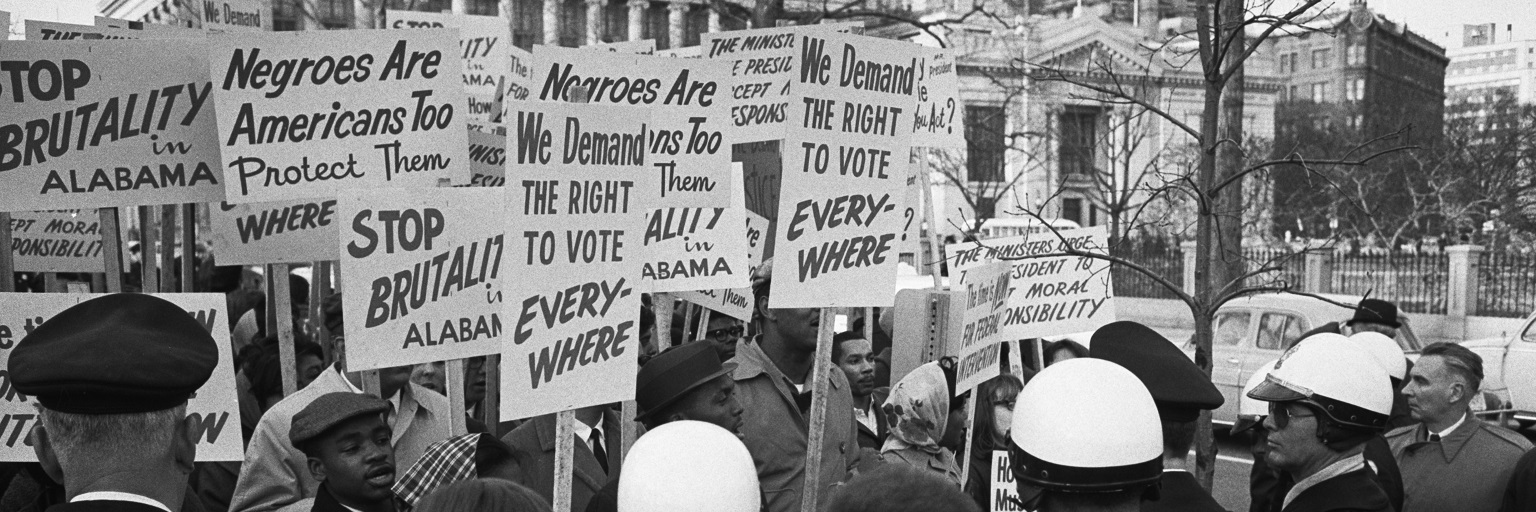Reconstruction & Jim Crow
After the Civil War, during Reconstruction, the Federal government sought to reunite and repair the nation while abolishing slavery and assisting newly freed individuals. Congress passed federal laws, including the the Civil Rights Act of 1866, the Civil Rights Act of 1875, and the Enforcement Acts of 1870-71, to dismantle slavery, protect civil and political rights, and prevent discrimination in public accommodations as well as intimidation and violence against African Americans exercising their right to vote and privileges as citizens. The Supreme Court curbed these efforts by declaring these laws unconstitutional, such as in the Civil Rights Cases (1883), and legitimizing segregation in Plessy v. Ferguson (1896). These decisions, coupled with the end of Reconstruction, paved the way for Jim Crow segregation, disenfranchisement, racial discrimination, and violence, particularly in Southern states.
Second Reconstruction & Civil Rights
Not only did individuals challenge Jim Crow segregation, disenfranchisement, racial discrimination, and violence in state and federal courts, but also called on state and federal governments to pass laws to protect their rights and prevent such abuses. Civil rights activists in the North and South joined organizations including the National Association for the Advancement of Colored People (NAACP), founded in 1909, and through the early to mid-20th century organized boycotts and grassroots campaigns to push for and create change on the state and federal level. Their efforts led to desegregation and anti-discrimination laws, including the Civil Rights Act of 1964 and Voting Rights Act of 1965. These activists paved the way for the Women’s Rights movement and LGBTQ Rights movement beginning in the mid-late 20th century, aided by the Civil Rights Act and successful legal challenges to discrimination as a violation of federal law and the 14th Amendment’s Equal Protection Clause.
Civil Rights Cases (1883)
The Supreme Court struck down the Civil Rights Act of 1875 as unconstitutional. The federal law had barred racial discrimination in public accommodations, including hotels and theaters. The Court held that Congress did not have the power to regulate privately owned businesses; the enforcement power under the 14th Amendment applied to state action and not private acts of discrimination. Learn More
Civil Rights Act of 1964
The Civil Rights Act was signed into law by President Lyndon Johnson on July 2, 1964. It prohibited discrimination in public accommodations based on race, color, religion, or national origin. The Act also barred employment discrimination based on race, color, religion, sex, or national origin. It created a Civil Rights Commission and an Equal Employment Opportunity Commission, and it contained provisions desegregating public facilities, schools, and addressing voting rights. Congress’s constitutional authority to pass the Act did not come through the 14th Amendment, but rather through the Commerce Clause in Article I, Sec. 8 of the Constitution, granting Congress the power to regulate interstate commerce. As stated in the text of the Civil Rights Act, public accommodations and employment “affect” commerce. Learn More
Bostock v. Clayton County (2020)
The Supreme Court held that the meaning of the provision in Title VII of the Civil Rights Act of 1964, prohibiting employers from discriminating against any individual based on “sex,” also included homosexual and transgender individuals. Learn More
- Clay Risen, The Bill of the Century: The Epic Battle for the Civil Rights Act (2014)
- “Civil Rights,” under Classroom Resources, posted by the National Constitution Center
- NAACP History and NAACP Legal Defense Fund History
- Franklin H. Williams Judicial Commission
“Women’s Rights and the Civil Rights Act of 1964,” includes documents and information about Title VII and Equal Employment Opportunity, posted by the National Archives
“Passage of the Civil Rights Act | 1964,” includes video and discussion questions, posted by PBS LearningMedia
“JFK, Freedom Riders, and the Civil Rights Movement,” includes activities and materials posted by NEH-EDSITEment

